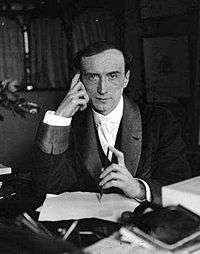Henry Bataille

Félix-Henri Bataille (4 April 1872 in Nîmes – 2 March 1922 in Rueil-Malmaison) was a French dramatist and poet. His works were popular between 1900 and the start of World War I.
Bataille's parents died when he was young.[1] He attended the École des Beaux-Arts and Académie Julian [2]to study painting, but started writing when he was 14. Henry wrote plays and poems, but after the success of his second play, La Lépreuse, he became a playwright exclusively. Bataille's early works explored the effects of passion on human motivation and how stifling the social conventions of the times could be. For example, Maman Colibri, is about a middle-aged woman's affair with a younger man. Later, Bataille would gravitate towards the theater of ideas and social drama.
Bataille was also a theorist of subconscious motivation. While he did not use his theories in most of his own works, he influenced later playwrights such as Jean-Jacques Bernard and the "school of silence".
Works
- La Belle au bois dormant, 1894
- La Chambre blanche (poetry), 1895
- La Lépreuse, 1896
- L'Enchantement, 1900
- Maman Colibri (Mother Colibri), 1904
- La Marche nupitale, 1905
- La Femme nue, 1908
- Le Scandale, 1909
- La Vierge folle (The Foolish Virgin), 1910
- L'Amazone, 1916
- La divine tragédie (poetry), 1917
- L'Animateur, 1920
- La Chair humaine (Human Flesh), 1922
Notes
- ↑ "Henry Bataille", Encyclopædia Britannica Online.
- ↑ (fr)La Rampe : revue des théâtres, music-halls, concerts, cinématographes, 1922
References
- "Bataille, (Félix) Henri". Retrieved 17 April 2009 from Funk & Wagnalls New World Encyclopedia database, EBSCOhost
- "Bataille, Félix Henry". Encyclopedia Americana. Grolier Online
- Buss, Robin. "Baitaille, Henry". Grolier Multimedia Encyclopedia. 2009. Grolier Online
- "Henry Bataille". In Encyclopædia Britannica. Retrieved 17 April 2009, from Encyclopædia Britannica Online
External links
-
 Media related to Henry Bataille at Wikimedia Commons
Media related to Henry Bataille at Wikimedia Commons